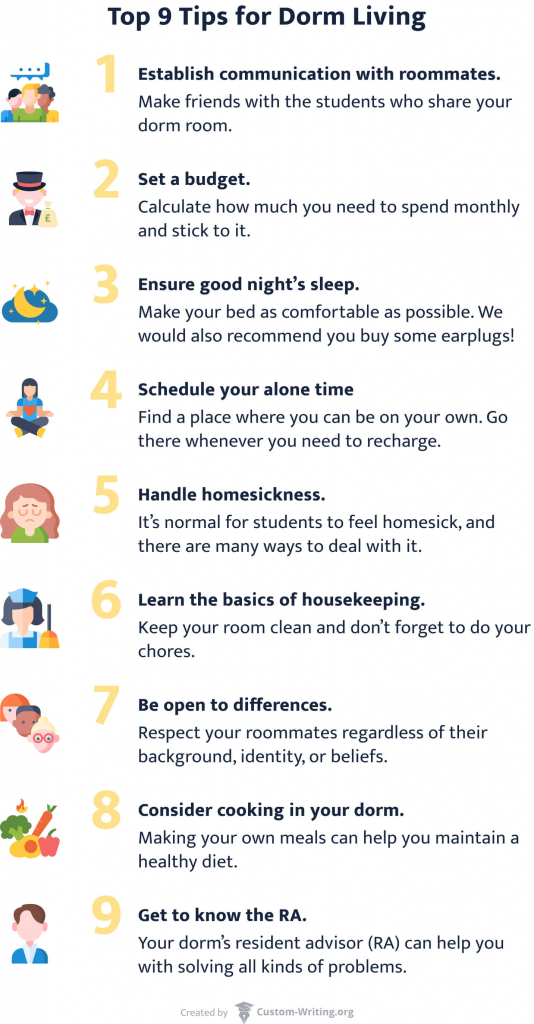College dorm rules are meant to help everyone live together comfortably and respectfully. After all, a dorm becomes a second home for countless students during their university years. And although college comes with many perks and exciting adventures, it’s not always easy to adjust to dorm living and make sure everyone is happy.
To make things smoother for you, the Custom-Writing.org team has compiled this collection of 24 best college dorm tips. Here, you will find expert advice on how to live in a dorm, rules to ensure harmonious relationships with roommates, and even pro tips on room decoration! With our guidance, you’re sure to make the most out of your student life.
🔝 Top 9 Tips for Dorm Living
Here are the top 9 college dorm rules that will help you have a seamless experience:

1. Establish Communication with Roommates
When you move into a dorm, you must be ready to share your space with other students. Establishing a friendly relationship with your roommates is critical if you want to feel at home in a new environment.
Here are our brilliant tips that will help you to connect with new people and avoid embarrassing situations:
- Set ground rules and revise them if needed. It’s best to agree on a specific set of dos and don’ts from the very start. If certain things or conditions are especially important to you, mention them so that you and your roommates can avoid quarrels. Remember that it’s best not to overstep your boundaries and be open to a conversation.
- Accommodate each other’s schedules. Living together is not the simplest task, especially when you and your roommates have different habits. That is why it can be beneficial to compromise and schedule a set time for using the room or the shower.
- Agree on the use of shared personal possessions. It’s normal for dormmates to share things to save money instead of buying all the necessities. Specifying which items are personal and which you are ready to share makes life in the dorm much smoother. You can use name tags and make exceptions for emergencies to avoid problems or misunderstandings.
- Take necessary precautions. Living in a dorm increases the chances of other people having access to your personal things and confidential information. That’s why it’s best to protect the files on your computer by using software that blocks unauthorized users. Agreeing to rules about locking doors to keep your personal possessions safe is also mandatory.
- Respect each other’s needs. As much as it is essential to establish specific rules, it’s also necessary to remember that your dormmates are individuals with their own habits and tastes. Respecting each other’s space and lifestyle is absolutely necessary when sharing the same room.
2. Set a Budget and Stick to It
Another vital thing about living on your own is sticking to a budget. Let’s talk a little bit about the ways you can do that.
Most students who begin studying at university live in a college department and have no stable income. Having a set budget and a certain amount for emergencies is obligatory so that you don’t suddenly run out of cash at the end of the month. For that reason, knowing how to use your budget sensibly is a skill almost every college student needs to learn.
Below are some actionable tips that will surely help you:
- Analyze your monthly income. This amount of money includes scholarships, money sent from your family members, part-time job salary, etc.
- Assess your monthly expenditures. Keep track of how much money you spend each month on the things you need and want. You can do it easily via your bank’s app.
- Do the math. Calculate the difference between your monthly income and your expenses.
- Organize your budget based on the results of your calculations. That way, you can easily adjust your spending habits. A budget will help you see if you can save up some extra money or if you need to spend less on the things you want. We also advise you to avoid taking out credit loans at this point: they will surely mess up your budget.
3. Ensure Good Sleep in Your Dorm Room
One thing you shouldn’t hesitate to spend your money on is sleep. Dorm rooms are notorious for their uncomfortable beds. It may not be so easy to take naps during your breaks or to enjoy deep sleep since your roommates may have different schedules, snore, or toss around a lot. We would advise you to bring the following items:
- Mattress topper. It will make your sleep comfier.
- Good pillow. It’s better to invest in one good quality pillow instead of buying several small ones.
- A heavy blanket. You should be ready for the cold, especially if your dorm is in a northern state.
- Earplugs and eye mask. These items may prove useful if you are sensitive to light and noise.
4. Schedule Your Alone Time
Starting a college and meeting new people can be thrilling, but even if you’re an extrovert who likes interacting with people, everyone still needs their “me time.” When you share a room with other people, it might be a little harder to get some time for yourself.
But don’t worry—there’s always a way! Check out these excellent tips that’ll help you get the alone time you need and make your college experience so much better:
- Go to a cute cafe or coffee shop. If you can find a small place where none of your friends usually hang out, you’ll have some time to read a book, enjoy a podcast, or just clear your mind and have one of your favorite drinks.
- Find a go-to study spot. Having a special study place on campus can take some pressure off you. You also wouldn’t have to worry about making noise when you study outside your room. Instead, having a study spot can keep you motivated and help you stay concentrated. The change of scenery also helps to take your mind off certain things and recharge.
- Visit the campus library. A library is a fabulous choice if you want to find some peace and have a quiet study session.
- Go outside. Going to a park may be a terrific idea if you have spare time in your schedule, especially when you’re stressed out. Walks in nature can help you relax, and you’ll feel more energetic afterward.
- Listen to music with headphones to drown out the noise. When it’s especially tough to find some alone time, music can be a way to tune out and get lost in your thoughts.
5. Find Ways to Handle Homesickness
Most people move to different cities when they start college. Living far away from family for the first time may result in serious homesickness. Yearning for home is not unusual among students, but the feeling can be pretty exhausting. Still, there are ways to make you feel less lonely and get over the longing:
- Communicate with your loved ones as often as you wish. There are plenty of methods, including voice and video calls, to help you get updates and chat with people close to you.
- Find a hobby. The simplest way to overcome homesickness is to surround yourself with nice people and do something you like. Try joining clubs or attending courses and meet students who share your passion. Keeping yourself occupied and having a new circle of friends will help you overcome the yearning for home and enrich your college days.
- Make your personal space feel like home. Bring some of your beloved plushies and decorate your room the way you like. Don’t shy away from expressing your uniqueness!
6. Learn the Basics of Housekeeping
Before moving into the dorm, students generally have no prior experience living alone. Housekeeping, in this case, may become a total nightmare. Keeping your room tidy is compulsory: since several people live in the same space, it gets messy pretty fast.
Misunderstandings regarding chores and cleaning often cause conflicts between roommates. That’s why we advise that you don’t forget to:
- Wipe all surfaces when you finish using them;
- Vacuum, sweep, and mop routinely;
- Do the dishes;
- Do your laundry.
It’s also crucial to have the essential cleaning supplies, such as:
- Dish soap
- Detergent
- Glass-cleaner
- Dishtowel
- Dish sponge
- Broom and dustpan
- Garbage bag
- Vacuum
- Reusable paper towels
- Disinfecting all-purpose cleaner
- Microfiber mop
7. Be Open to Differences
One of the key tips to having a healthy dorm life is to be noncritical. When you randomly get roomed with someone, this person is likely to come from a radically different background. Respecting each other regardless of differences is vital if you want to avoid quarrels and make connections. You can also think of it as a possibility to discover new things about people and the world around you!
So, here’s what to do if your roommate:
- Comes from a different culture. Most people are proud of their heritage, and you may freely ask questions related to your roommate’s culture as long as you are civil. Let your empathy help you comprehend them and their culture better.
- Has different religious views. Faith can be a delicate topic, but it doesn’t have to be. The most important thing is not to impose your views on your companion. Rather, try to have an honest conversation, and maybe both of you can learn something new.
- Has dissimilar sexual preferences. Don’t freak out if your roommate’s sexuality varies from yours. If they happen to prefer the same sex, it absolutely does not mean that they will be attracted to you. In college, you’re bound to meet individuals who are open about who they love, so having a roommate with a different sexuality may be your chance to befriend diverse people and learn from them.
- Has a different upbringing. Sometimes, conflicts between dormmates occur due to their contrasting experiences. When this happens, it’s better to step back and loosen up. You and your roommate may just need to find a neutral ground and seize this opportunity to discuss each other’s background.
8. Consider Cooking in Your Dorm
Even though you don’t have to make your own meals as a student, you may want to try it to maintain a healthy diet or save some cash. Purchasing essential cooking equipment will allow you to make smoothies and fresh salads, which is a fantastic way to take care of yourself.
Here’s what you might consider taking to your dorm room:
- Mini fridge. It’s perfect if you want to store raw ingredients such as fruits and veggies, which are often in short supply in college meal plans. Furthermore, a refrigerator is useful for keeping perishable foods like meat, eggs, and milk or stashing your leftovers.
- Knife and cutting board. Even if you don’t do much cooking, it’s still a brilliant idea to grab these items. You can use them to arrange yourself a sandwich, salad, or simply chop some fruit.
- Kettle. If you are a tea lover or have a habit of making some overnight oatmeal, a small kettle is a necessity. It’s also a superb choice if you enjoy some instant rice or noodles occasionally.
- Hot plate and pot. If you plan to cook or roast your meals occasionally, these two items are a necessity.
- Toaster. A toaster is a terrific option if you don’t want to buy premade sandwiches. It’s much easier, cleaner, and cheaper to make them yourself.
- Blender. This is a splendid choice for those who love smoothies and prefer a healthy diet. Besides, it can help you make tasty cereal.
9. Get to Know the RA
Imagine there’s a problem you can’t settle on your own. What should you do? For that reason, every dorm has a resident advisor (RA).
The title may differ—resident advisor, resident assistant, community assistant, community advisor—but the concept stays the same. An RA is an upperclassman who lives in the residence hall with other students, answers their questions, and gives support. Usually, the RA is the first person students meet upon moving in on campus. Community advisors are also the ones who are responsible for organizing social events.
Student residents benefit from the presence of an RA who provides much-needed assistance and can answer school-related questions. It also happens that many colleges offer perks like a financial stipend or a single room to those who take on that role. Being a community assistant also helps develop social, leadership, and problem-solving skills, which are surely beneficial. So, why not think about becoming an RA later on?
😊 4 Dorm Life Tips for Introverts
We have previously described many perks and hardships of living in the dorm. In this part, we’ll reveal some life hacks for introverted students to whom having some alone time is necessary to feel recharged. Dorm life can be overwhelming at times, so here are some ideas that might help you adjust and feel more at ease during such times:

- Create a comfort zone for yourself. Making your living space cozy is definitely something you should consider. Buy yourself some plushies, fluffy blankets, beautiful fairy lights, or plants. Making your corner of the room comfy will make it easier to feel comfortable in your new space and relax after a long day of classes.
- Push yourself out of your comfort zone. Even if socializing doesn’t come easily to you, staying locked in your room is not an option. Try to make new buddies who can keep you company during lunch or with whom you can occasionally play video games. When someone approaches you, don’t shy away. Instead, focus on asking simple questions to better get acquainted with the person.
- Find friends who are like you. Finding people with whom you can establish a real bond is a perfect way to feel contented in a new place. You could try joining clubs to meet people with similar interests. That will facilitate striking up a conversation. There’s always a chance to come across other introverts who share your hobbies and look for genuine friends.
- Prioritize face-to-face interactions. Social media or streaming platforms like Netflix serve as a substitute for real-life contacts for many students. Still, these things can never replace face-to-face communication. Don’t get too invested in your phone or social media and try to make some friends in real life. Even if you have just one pal you can rely on or talk to, your college life will improve enormously.
🎓 11 Bonus Tips for Freshmen
And finally, we would like to share a few recommendations from students who’ve already experienced life in a dorm. These useful hints will make the life of any college resident much smoother:
- Raise your bed. Getting bed lifts will maximize under-the-bed storage and create more space for you to keep personal items and clothes.
- Consider smart storage. When you move into a dorm, you have to realize that there won’t be much space to store your possessions. Set some space aside and bring stackable drawers with you. We also recommend you to take advantage of under-the-bed storage and adhesive hooks.
- Buy a pair of shower shoes. Since showers are shared in the dorm, there’s an extreme likelihood of getting foot fungus. To avert it, we strongly advise you to bring a pair of flip-flops to use in the shower.
- Get a pair of rubber boots. Taking a couple of waterproof boots is a must, especially if your college is in a state where it frequently rains.
- Use a bike to get around school grounds. Since university campuses are pretty big, biking is an efficient way of quickly getting from one place to another.
- Benefit from your college discounts. Many organizations and clubs offer students discounts or even free snacks (including pizza!)
- Don’t bring a printer. If you are thinking about purchasing a printer, forget that idea. Every campus has printers, plus you can access most study materials online.
- Try the Pomodoro method for time management. Time management is a skill that most college students need to work on. If you’re struggling with concentration, we suggest using the Pomodoro method. The point is that you commit to a 25-minute work session before relaxing for 5 minutes. You must repeat the cycle 4 times before taking a more extended break.
- Avoid doing your laundry on weekends. Typically, people do their laundry on weekends when they have more spare time. If you wash your clothes on a weekday, you won’t have to compete for the washing machine.
- Bring a small safe for storing essential items. When you stay with other people, there’s always a danger of having your personal property stolen. Getting a small safe to protect costly items is always a superb idea.
- Bring an ethernet cable. Since many people use dorm wi-fi, bringing your own ethernet cable is a wise decision that will save you time and nerves.
✅ Dorm Life Checklist
Moving in on campus is very similar to moving into a new house. There are loads of things to keep in mind. All the study and document-related questions make it even harder to consider every detail.
To prevent unnecessary issues, go over this checklist of all items you need to pay attention to:
- Identify your goals. Take your time to determine your social, personal, and academic goals. That way, you’ll know what your priorities are, how to manage your time, and where to concentrate your energy.
- Know what activities recharge you and what triggers your procrastination. Spend more time doing things that motivate you and fill you up with energy while minimizing those that exhaust you and decrease your self-worth.
- Decide how you’ll continue to communicate with friends and family. Find ways and time to chat with your family and friends, as they may be one of the primary sources of support during your college days.
- Detect where the local stores are. Take your time to learn more about the area where you will live. That way, you won’t feel completely lost during your first weeks.
- Pack as light as possible. Remember that dorms are not very roomy. Only bring the necessities!
- Compile a list of school supplies and dorm room items and use it when you’re packing. Review this detailed checklist to guarantee you don’t forget anything.
Thanks for reading this article! We hope you found it engaging. Share your ideas or dorm experiences in the comments, and feel free to show this guide to your buddies. Our final advice is: have fun and enjoy your college experience!
🔍 References
- 7 Tips for Adjusting to Dorm Life: SoFi
- How to Deal with Homesickness at College: CNBC
- The Introvert’s Guide to Dorm Living: Nitro College
- Extroverts vs. Introverts: Tips for Living in the Dorm: Trevecca University
- An Introvert’s Guide to Residence Life: The University of British Columbia
- 25 Tips to Survive Your Freshman Year: Snow College
- Advice for High School Freshmen from Departing Seniors: Western Governors University
- The Ultimate Guide to Sleeping in a Dorm Room: Refinery 29









![Changing Career Paths after Graduation… or Later [Guide + Infographic]](https://custom-writing.org/blog/wp-content/uploads/2021/09/Changing-Career-Paths-after-Graduation-or-Later-284x153.jpg)
![Being a Successful Online Student: 6 Must-Have Skills [Infographic]](https://custom-writing.org/blog/wp-content/uploads/2021/09/Being-a-Successful-Online-Student-284x153.jpg)
